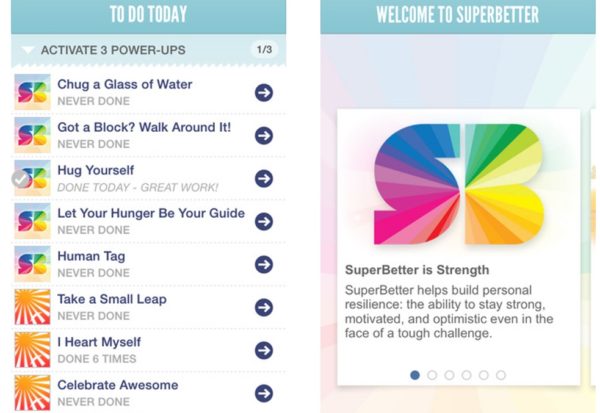There are a lot mental health apps out there, but the newest string of them might be the most intriguing — apps that make a game out of fighting your anxiety/depression/ocd etc.
Vox has a great breakdown, and gives the app SuperBetter as an example.
The whole mental health thing is approached like a game. Your opponents are things like black-and-white or catastrophic thinking, and you use classic anxiety-battling techniques to beat them.
Now what makes this different? It’s all set to video game things like “Power-Ups,” “Quests,” and “finding allies.”
I just downloaded it, told the app I wanted to battle depression and the game suggested I “activate” 3 Power-Ups today: It gave me choices like “Chug a glass of water,” “Walk around a Block,” and “Human Tag,” which I guess is reaching out to a friend or something.
I can already imagine some Christians rolling their eyes and saying, “Oh come on. You honestly think this hokey-stuff can beat prayer for busting depression?”
Well, the app lets you create your own “Power-Up.” So you could create “Pray 15 minutes” or better yet “Pray 2 hours”, if you wanted to.
And remember, God uses exercise and tons of other things, including medication, to help our health. Also, I want to clarify that during severe episodes of anxiety/depression, many of us (including myself) tend to be treatment resistant, but there’s scientific proof apps like SuperBetter work (more below).
But anyway, just for kicks — I just chugged a glass of water, a cool sound happened, and I got +2 resilience.
Next, I have to battle one “Bad Guy” today — examples are “the self-critic,” “the sticky chair” etc. Or you can create your own.
It’s a really great idea because it uses clinically-validated anxiety-busting techniques (exercise etc) in a format that’s proven to boost motivation (the creator even wrote a dissertation on how the psychology of games can help us).
But does it work? Seems to.
Vox:
The website also boasts impressive results in two meta-analysis studies, which showed that SuperBetter had the greatest effect for reducing anxiety and depression symptoms, compared to a host of other smartphone apps also evaluated in randomized controlled trials.
Even on SuperBetter itself, McGonigal likes to lead with the science. The app shows you Science Cards, mini-articles that explain exactly why its exercises — from mindfulness meditation to gratitude journaling — are effective at changing your brain to reduce anxiety.
Many of them link out to articles and books written by scientists, including the app inventor’s twin sister, Stanford psychologist Kelly McGonigal. Kelly was the first person Jane McGonigal called when she decided to create her recovery game in 2009, and she later incorporated the research of many other experts.
If you think this is hokey, don’t forget that the game is just a motivating technique to do things that science suggests work.
And a University of Pennsylvania study suggests this isn’t hokey. In their randomized, controlled trial, researchers found the app significantly reduced depressive symptoms, as well.
I should also note that the app isn’t just about mental health — you can also choose quests to help you tackle chronic pain or concussive symptoms in a gaming format.
There seems to be some evidence it helps for that, too.
For example, a 2015 study presented at the American College of Rehabilitation Meeting found that every single patient using SuperBetter had reduced concussive symptoms and depression, while only half in the control group did.
Pretty cool. Now excuse me while I go watch Netflix so I can Power-Up. I’m kidding. I watch Amazon Prime.
[Photo: iMedicalApps]

